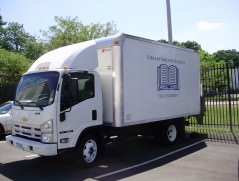Library Collection Services
Special Collection Deliveries
In 2007, as a result of a formal process improvement initiative, a number of innovations were introduced that permitted better tracking and greater security for special collection materials being transported by LCS. Items are now tracked during the transport process by making use of functionality available in the LSF inventory software. By using the Maintain Transit Bin function, LCS staff are able to link discrete items to specific transport containers and then create a manifest detailing the contents of every outgoing transport container. A system of mutual notification announcing delivery needs has also been instituted for LCS and on-campus special collection units.
Other security enhancements for special collection deliveries have been adopted since 2007. Drivers are now instructed to keep the truck locked at all times during the delivery run except when loading/unloading. Transport bins for special collection materials are secured with numbered seals which—if broken—provide evidence of tampering. Finally, in 2007 Yale authorized GPS tracking for all of its Library vehicles. Not only does GPS provide the LCS managers with information concerning the delivery truck’s whereabouts, but the software also collects valuable information about mileage driven and fuel consumption. A university-approved GPS product also offers the functionality to track vehicle maintenance schedules and on-time delivery performance.
The most recent changes to this service, implemented in January 2016, were driven by the increasing demand for special collections shelved at LSF. In response to this ever-growing workload, LCS now uses two vehicles to make deliveries: one servicing the Beinecke and special collection units housed at SML, the other devoted to transporting materials for the remaining special collection units on campus as well as for library units that have been relocated to 344 Winchester. Other stops, previously not serviced by LCS, such as the Medical Historical Library and YCBA, have also been added to the special collection delivery route.
A further innovation phased in over several months is the use of an electronic Customer Notification Form as the approved method of communication between on-campus units and LCS. Developed with the assistance of Lauren Brown in Access Services, this form allows special collection units to notify LCS concerning materials that require transport to various locations throughout the campus. It also allows on-campus units to request the additional transport equipment (bins, dollies, and flatbeds) they may require. Related forms provide other functionality, such such as allowing LCS to create a single, unified delivery manifest for the driver of each truck, or providing history of pick-ups and deliveries for on-campus customers.
